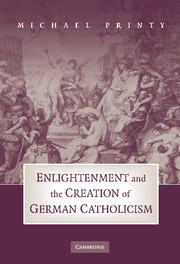Book contents
- Frontmatter
- Contents
- Acknowledgments
- 1 Introduction
- Part One PERFECT SOCIETIES: RETHINKING THE CHURCH AND THE STATE
- 2 The Liberty of the German Church: Febronianism and the German Gallicans
- 3 The German Church and the Absolute State
- 4 Church and Empire in the Eighteenth Century
- 5 Collegialism: The Rise of the State and the Redefinition of the Church
- Part Two THE UNIVERSAL CHURCH AND THE UNIVERSAL CLASS
- Bibliography
- Index
3 - The German Church and the Absolute State
Published online by Cambridge University Press: 02 July 2009
- Frontmatter
- Contents
- Acknowledgments
- 1 Introduction
- Part One PERFECT SOCIETIES: RETHINKING THE CHURCH AND THE STATE
- 2 The Liberty of the German Church: Febronianism and the German Gallicans
- 3 The German Church and the Absolute State
- 4 Church and Empire in the Eighteenth Century
- 5 Collegialism: The Rise of the State and the Redefinition of the Church
- Part Two THE UNIVERSAL CHURCH AND THE UNIVERSAL CLASS
- Bibliography
- Index
Summary
True ecclesiastical and secular public law and the Concordia sacerdotii et imperii must be sought in the acts of Jesus, in the teaching of the apostles, and in the tradition of the church. This must teach us how the justification for both church and state – each in its proper boundaries – can exist next to each other without collision.
– Peter von Osterwald, 1766In the wake of the Seven Years' War, German states, Catholic and Protestant alike, needed to come to terms with the new fiscal and economic pressures brought about by modern war-fighting and modern bureaucracy. For Catholic states, this process required a wholesale rethinking of political theology. This rethinking occurred within the larger European intellectual context of the mutual redefinition of the church and the state. The development of legal, fiscal, and administrative tools and infrastructures in the eighteenth century represented an intensification of a process that had begun in the sixteenth century. The conceptual elaboration of the state, as Quentin Skinner has argued, marked something new in the history of early modern political thought. This new view of political life held that “our duties are owed exclusively to the state, rather than to a multiplicity of jurisdictional authorities, local as well as national, ecclesiastical as well as civil.” The emergence of this new idea of the state also required a new ideological justification, and conditions in Catholic Germany meant that the process of rethinking would occur somewhat differently than in other parts of Europe.
- Type
- Chapter
- Information
- Enlightenment and the Creation of German Catholicism , pp. 55 - 81Publisher: Cambridge University PressPrint publication year: 2009



